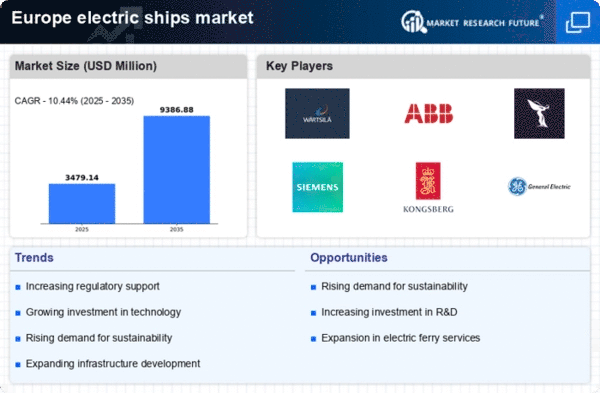Top Industry Leaders in the Europe Electric Ships Market

Strategies Adopted:
Technological Innovation: Key players invest in research and development to develop advanced electric propulsion systems, energy storage solutions, and vessel designs that offer improved efficiency, reduced emissions, and enhanced performance, catering to evolving customer demands and regulatory requirements.
Strategic Partnerships: Forming strategic partnerships and collaborations with government agencies, research institutions, and technology providers facilitates access to funding, expertise, and resources, enabling companies to accelerate innovation and strengthen market position.
Market Expansion: Expanding market reach through international sales, joint ventures, and acquisitions enables companies to access new customers, secure contracts, and diversify revenue streams, reducing dependency on specific markets or regions.
Customization and Flexibility: Offering customizable solutions tailored to specific customer requirements and operational needs enhances companies' competitiveness by addressing diverse market segments and niche applications effectively.
Europe's Electric Ships Market includes
BAE Systems plc (UK)
Kongsberg Maritime (Norway)
Wärtsilä (Finland)
Siemens (Germany)
ABB (Switzerland)
General Electric (US)
Leclanché (Switzerland)
AKASOL AG (Germany)
Norwegian Electric Systems (Norway)
Volvo Penta (Sweden)
Factors for Market Share Analysis:
Technology Leadership: Companies that demonstrate technology leadership through innovations in electric propulsion, energy storage, and vessel design gain a competitive edge by offering cutting-edge solutions that deliver superior performance, efficiency, and environmental sustainability.
Market Presence: Established players with a strong market presence, extensive customer relationships, and a proven track record of delivering high-quality electric ships secure market share by leveraging brand reputation, customer trust, and industry expertise.
Product Portfolio: The breadth and depth of product offerings, including a range of electric ship types, sizes, and applications, influence market share by enabling companies to address diverse customer needs and market segments effectively.
Regulatory Compliance: Compliance with environmental regulations, emissions standards, and sustainability requirements enhances companies' competitiveness by demonstrating commitment to environmental stewardship, social responsibility, and regulatory compliance.
New and Emerging Companies:
EOLOS Floating Lidar Solutions (Spain)
Seaway 7 (Norway)
eCap Marine (Germany)
H2X (France)
Electric Norway (Norway)
DNV GL (Norway/Germany)
PBES (Norway/Canada)
Shipyard De Hoop (Netherlands)
Havyard Group (Norway)
Teco Electric & Machinery Co., Ltd. (Taiwan)
Industry News:
Project Developments: News of new electric ship projects, contracts, and partnerships highlight industry developments and companies' success in securing business, driving market growth and competitiveness.
Technological Advancements: Announcements of technological advancements, such as improvements in electric propulsion systems, battery technology, and vessel automation, showcase companies' innovation capabilities and enhance market competitiveness.
Regulatory Updates: Updates on environmental regulations, emissions standards, and government incentives for electric ships influence market dynamics by shaping demand for environmentally friendly and energy-efficient vessels.
Market Trends: Reports on market trends, customer preferences, and industry forecasts provide insights into market opportunities, challenges, and competitive dynamics, guiding companies' strategic decisions and investment priorities.
Current Company Investment Trends:
Research and Development: Investments in research and development focus on developing next-generation electric propulsion systems, energy storage solutions, and vessel designs that offer improved efficiency, performance, and environmental sustainability.
Strategic Partnerships: Collaborations with government agencies, research institutions, and technology providers enable companies to access funding, expertise, and resources for technology development and market expansion initiatives.
Market Expansion: Investments in market expansion initiatives, including international sales, distribution channels, and customer support infrastructure, aim to penetrate new markets, expand customer base, and increase market share, driving revenue growth and profitability.
Sustainability Initiatives: Increasing investments in sustainability initiatives, such as carbon reduction, energy efficiency, and renewable energy integration, align with industry trends and customer preferences for environmentally friendly solutions, enhancing companies' brand reputation and market competitiveness.
Overall Competitive Scenario: The Europe electric ships market is characterized by intense competition among key players, driven by technological innovation, strategic partnerships, and market expansion initiatives. Factors such as technology leadership, market presence, product portfolio, and regulatory compliance influence market share dynamics. New and emerging companies contribute to market competitiveness by introducing innovative solutions and challenging established players. Industry news, regulatory updates, and current investment trends reflect companies' efforts to maintain competitiveness, capitalize on market opportunities, and address evolving customer requirements in the rapidly growing electric ships sector.
Europe Electric Ships Industry Developments
For instance,November 2020Hyundai Motors partnered with Vinssen, a start-up based in Korea, to develop a new vessel powered by hydrogen fuel cells by December 2021. Vinssen will supply 95kW hydrogen fuel cells. If the eco-friendly ship reaches the expected level in terms of performance, it will be produced on a large scale.
For instance,September 2020Holland Ship Electric selected Corvus Energy to deliver lithium-ion battery-based energy storage systems (ESS). They are meant for five new all-electric ferries developed by Holland Shipyards Group for GVB, Amsterdam's municipal public transport operator.




